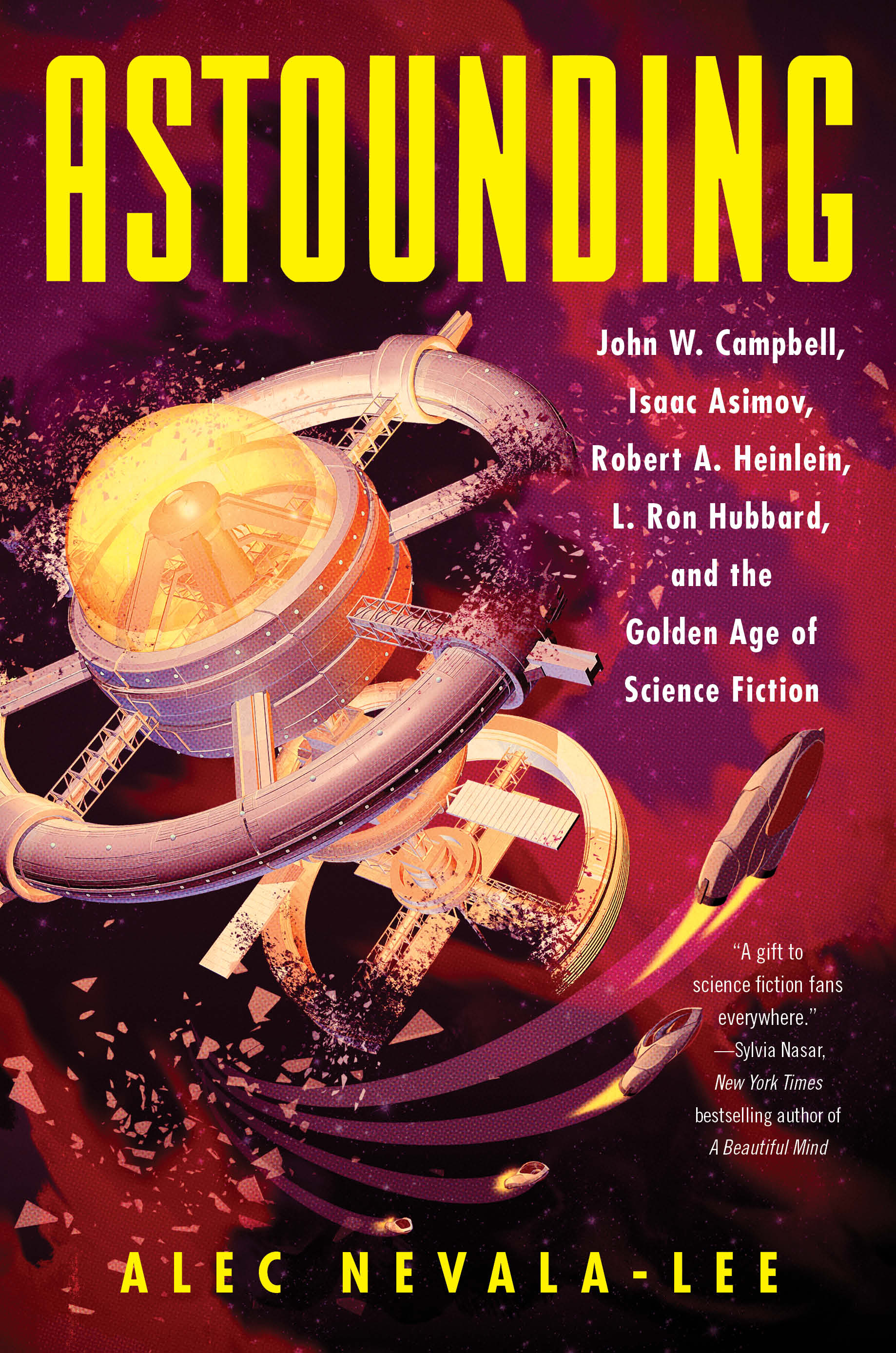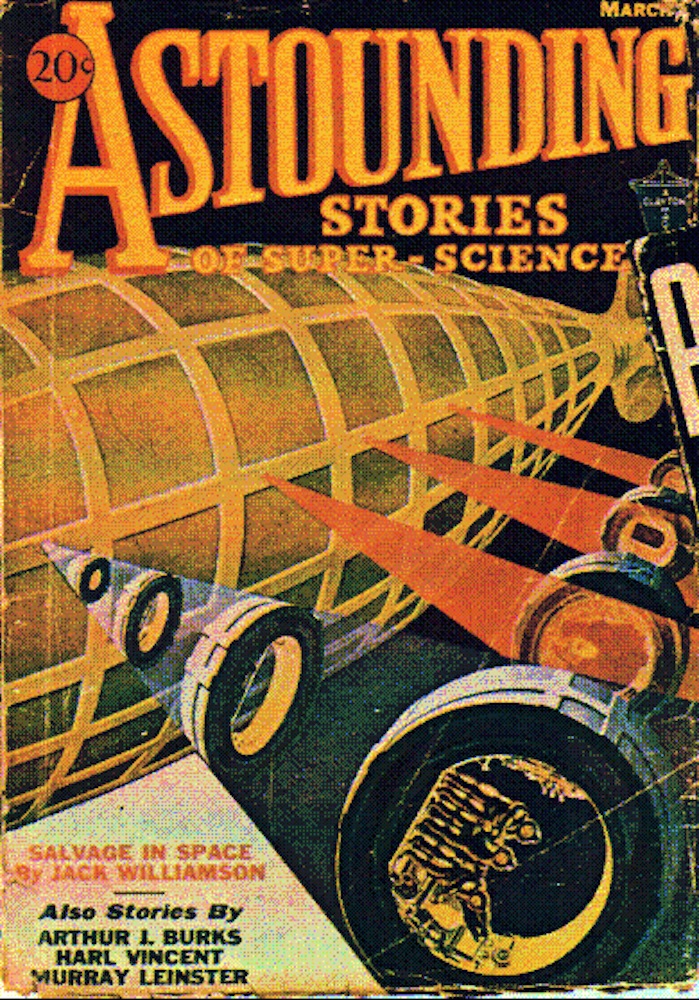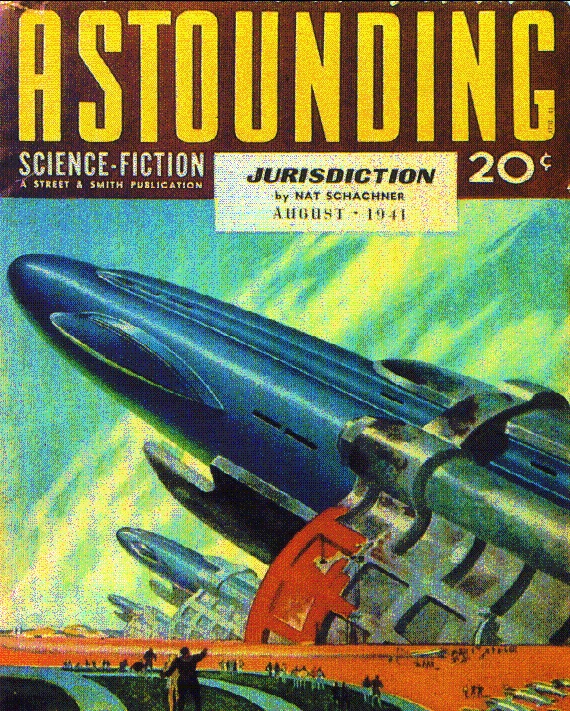'Astounding' Chronicles 4 Titans of Science Fiction's Golden Age (Warts and All)

In his new book "Astounding," coming out today (Oct. 23), Alec Nevala-Lee follows four titans of the golden age of science fiction who guided the genre during its formative years. His look into the lives of Astounding Science Fiction magazine editor John Campbell and authors Isaac Asimov, Robert Heinlein and L. Ron Hubbard — later famous for starting the Church of Scientology — shows how these men's lives shaped science fiction and how science fiction itself evolved during its formative period.
Nevala-Lee read hundreds of stories from the science fiction archives to pull together his narrative — objectively, he told Space.com, he found that Heinlein was the best science fiction writer of his era — and tracked the evolution of those stories from disposable adventures to serious predictors and influencers on the modern world.
Space.com talked with Nevala-Lee about these four science fiction standouts, overall trends in the field and how science fiction shaped humanity's destiny in space. [Read an excerpt from 'Astounding' ]
Space.com: How did you decide to profile the golden age of science fiction in this way?
Alec Nevala-Lee: I've been a science fiction fan for a long time, obviously, and I've been writing short science fiction since my early 20s, and most of my stories appeared in Analog — which is what Astounding Science Fiction is known as these days. It occurred to me a few years ago to write a book about Astounding magazine. At first, my idea was I would just go back and read back issues of the magazine and do a commentary on how science fiction evolved over time, which might have been a fine book for someone to write. But I realized very early on that there'd never been a biography of John W. Campbell. At the time, I was familiar with Campbell only in very general terms, but I knew that he would make a fantastic subject for a biography. He's this really controversial, influential, complicated figure with this very interesting personal life. He knew all these writers, and he was in the center of science fiction for a decade. So it seemed like a really fantastic project to take on.
[After some editor's suggestions] it became this four-part group biography. It also encompasses the science fiction community, and the rise of fandom, and all this other stuff. It ended up being a much more ambitious, complicated project than I had originally envisioned.

Space.com: What were the main sources you used to pull this together?
Get the Space.com Newsletter
Breaking space news, the latest updates on rocket launches, skywatching events and more!
Nevala-Lee: One thing that I lucked out on is that the primary sources here are just incredible. For one thing, there are thousands of pages of letters that Campbell wrote, that Heinlein wrote, that all these guys wrote that I could draw upon. These are letters that have never really been looked at in this kind of detail before, and they're just incredibly candid and detailed and full of great stories. That was a huge plus.
But also, there's a lot of really great stuff that is scattered throughout the history of science fiction, like memoirs and other people's books that have never really been organized into a coherent story. And so, just going back and reading other people's accounts of this period and trying to assemble those pieces into a book that made sense as a narrative was really fun.
Space.com: Were there any aspects of their stories or science fiction history that really surprised you?
Nevala-Lee: All four of them, there were things I never could have expected.
Probably the biggest scoop of this book, as I see it, is Campbell's involvement with Hubbard, and how intimately he was part of the development of the ideas that later became Scientology.
His hand was everywhere in those ideas, and a lot of them are still present in Scientology. To give Campbell his due in this story was a big part of what I wanted to accomplish.
Space.com: You describe the subjects' importance to the genesis of science fiction without downplaying aspects of their personalities and stories that are problematic. How did you balance those aspects?
Nevala-Lee: One advantage that I had going in was that I was not necessarily a fan in the sense that I was a hardcore reader of golden-age science fiction. I didn't really have an agenda going into this project.
One thing you see in science fiction scholarship and biographies — many of which are really useful, but they're often written by fans, for fans … Even really comprehensive, interesting books about these writers often suffer from the fact that their author is very close to the subject.
I wasn't out to get anyone, but I also wanted to present what I found as objectively as I could. With all these writers, there's stuff there that it's very hard to talk about without becoming very critical. I try to present the full picture, as much as I can, but there are undoubtedly things about all four of these writers that are really troubling.
Space.com: More broadly, is it possible to celebrate great authors while acknowledging their flaws in this way?
Nevala-Lee: Honestly, like a lot of us I'm still working through how I feel about that problem. I think you can acknowledge someone's importance and, in some ways, enjoy their work — especially if they've passed on — while also acknowledging aspects of that legacy that are less attractive. It's all part of the same story.
To take two examples. Campbell was an enormously influential person, he wrote great stories himself, including "Who Goes There," which I think is one of the best science fiction stories of all time, and he was undoubtedly responsible for making science fiction what it is today. But at the same time, he expressed views that are very racist, and it became more obvious later on, but it was in the background for this entire period, and it really affected the writers that he published, or at least his interest in diversifying the voices that were in the magazine. One thing I've thought about a lot recently is that you don't get diversity in any field by accident; it has to be a conscious choice, you have to prioritize it. And for Campbell, this wasn't important. And I think it's a real loss. I think he bears part of the blame for the lack of diversity in science fiction during that period. You can't talk about his importance without acknowledging that fact at the same time.
The other big example here is Asimov, who is the most famous science fiction writer in the world, by almost any measure, and he was really important to me growing up, and to a lot of other people I know. But he groped women at conventions for decades; he was basically guilty of sexual harassment. And it was kind of an open secret within science fiction, and everybody seems to know about it ... and it's inseparable from his stature as this iconic writer, because if you're a young woman, and you're looking for mentorship or support as a writer, you can't go to Asimov. You can't go to the most influential writer in the field because you know he's going to regard you in the same way. It's all part of the same story, and there's no way to totally separate one part from the other.

Space.com: What connections have you found with science fiction in that era and where it's going today?
Nevala-Lee: The big story in science fiction from the past 5 years, and probably longer, is about representation and diversity.
The need to exclude some groups and include others, this stuff has been happening for a long time. Seeing it happen in the 30s was amazing; it really changed my perspective on what's happening in science fiction right now. Right now, we're seeing an overdue reaction against the lack of diversity that was true of the Campbell period. That, to me, is the big story right now. This overdue reckoning with the assumption that people like Campbell were very happy to keep in place.
Space.com: Can you talk a bit about how science fiction from this era has shaped our worldview?
Nevala-Lee: One thing I like to talk about is the way in which science fiction affected our idea of the future and encouraged us to see space, especially, a certain way. If you look at the history of science fiction, the very first pulp stories, they weren't very good. These are adventure stories, and they happen to be set in space because that's a great backdrop for fiction. The writers who were writing westerns, or adventure fiction, or naval fiction, and they just transferred these stock stories into space, because it sells, and there's an audience for it. Later on, science fiction under Campbell and other editors starts to take itself more seriously as prediction. They're saying, this is not just escapist fiction, we're actually trying to work out scenarios for what the future will look like. But they're still in space.
Space kind of gets grandfathered into science fiction because that's where these stories have always been set. It leads to this interesting idea that as a species we're destined to enter space. Manned spaceflight, space colonization, that's what we're supposed to be doing. I'm not saying that's wrong, but that's an unexamined assumption that we tend to take for granted because we've read so much science fiction about it, but when we look back, it's not really a prediction about what makes sense for us on a practical level, it's more a reflection of the earliest version of science fiction, which is much more about telling a fun story than about forecasting a plausible vision for the future. [NASA's Giant Space Colony Concepts Explained (Infographic)]

Space.com: I was surprised how specifically these authors wanted it to be a prediction.
Nevala-Lee: The four main figures in this book are all very different, in certain ways, but they're all very ambitious, and they all have a very heightened sense of their importance, and the impact they have on the readers. The sense that you're predicting the future, but you're also teaching readers how to think about the future, and you're getting people to enter the sciences, and you're serving as this educational force, which really is unique to science fiction. There's no other genre that makes these claims for itself. I don't think it's an accident that these four writers who arrived at science fiction in very different ways stayed there because it was this perfect vehicle for their personal ambition.
Space.com: Except for Hubbard, who found another vehicle for his ambition.
Nevala-Lee: But then science fiction stays with him. One thing that I think is really interesting is that Hubbard was not really a science fiction fan. He didn't really like writing it for his own sake, he's much more a nautical fiction or western fiction writer, but it sold, he did well doing it, and when he began to go off on his own, his followers were science fiction fans, and he wrote to them, tailored his teachings to the audience he had available. That's why scientology has all this space opera stuff in it that I don't think meant a lot to Hubbard personally, but it was definitely material that he knew would appeal to his disciples.
Space.com: Do you think humanity is actually headed to space?
Nevala-Lee: In some ways, my view on this has changed since I started writing this book, but the more aware I am of how much our feelings about space travel have been shaped by science fiction, the more I tend to feel that we have more important things to deal with on Earth at the moment, and that maybe we can leave it to the next generation to go into space, as long as we can fix some more immediate problems in the meantime.
This interview has been edited for length. You can buy "Astounding" on Amazon.com.
Email Sarah Lewin at slewin@space.com or follow her @SarahExplains. Follow us on Twitter @Spacedotcom and on Facebook. Original article on Space.com.
Join our Space Forums to keep talking space on the latest missions, night sky and more! And if you have a news tip, correction or comment, let us know at: community@space.com.

Sarah Lewin started writing for Space.com in June of 2015 as a Staff Writer and became Associate Editor in 2019 . Her work has been featured by Scientific American, IEEE Spectrum, Quanta Magazine, Wired, The Scientist, Science Friday and WGBH's Inside NOVA. Sarah has an MA from NYU's Science, Health and Environmental Reporting Program and an AB in mathematics from Brown University. When not writing, reading or thinking about space, Sarah enjoys musical theatre and mathematical papercraft. She is currently Assistant News Editor at Scientific American. You can follow her on Twitter @SarahExplains.









